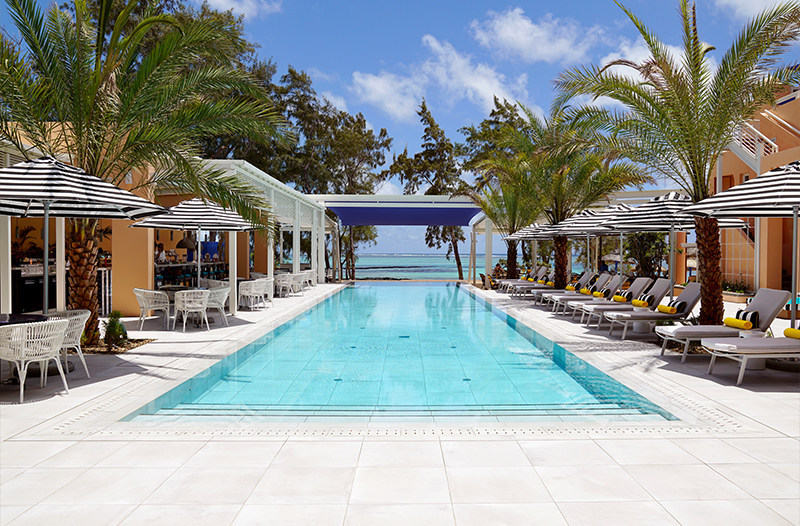Newly launched hotel brand, SALT, has opened the doors to its first resort, 59‐key SALT of Palmar located on the east coast of Mauritius. It is a beautiful base conceived to champion sustainability, connect with the local community and introduce culturally curious, style-savvy, modern travellers to the real Mauritius.
Its distinctive look is born out of a collaboration between local Mauritian architect Jean-François Adam of JFA Architects, an award-winning visionary behind notable contemporary spaces in Mauritius and abroad; and French artist, Camille Walala, whose vivid murals adorn buildings across the globe.
Devoted to all things local and sustainable, the new hotel brand is committed to taking guests to people – not just places – and unearthing the beating heart of destinations. At the core of Jean-François’ designs is a desire to bring the natural environment and local Mauritian way of life to the forefront, giving every visitor a real sense of what his homeland has to offer. Taking an incredible existing geometric, riad-like building on the fringe of Palmar beach he carefully repurposed the standing structures to accentuate the hotel’s proximity to the sea. As part of this, he orientated all beds to face the water and redesigned the pool to reinforce its connection with the beach. In addition, he played to the island’s warm tropical light, allowing the location’s natural colours to shine. Fauna and flora have been protected throughout this project. Jean-François’ explained, “Everything about the hotel is designed to bring people together. From the communal tables in the bakery, restaurant and beach bar, to Mauritius’ ϔirst roof-top bar and the inviting spaces in the SALT equilibrium spa, it is all about gathering and sharing stories of travels and enjoyment of this incredible location.”
Camille’s task was to find the perfect balance between her own creative impulse and the authentic expression of the island’s character – fresh, playful and irresistibly positive in outlook. To find inspiration, she travelled around Mauritius, meeting with local artisans and absorbing the bright palette that punctuates the island; from verdant landscapes, brightly painted houses, azure seascapes and show-stopping sunsets, to the spirit of its communities and the colourful mosaic of culture that makes Mauritius so special. Walala commented, “People paint their houses in the most amazing tones that really stand out against the lush tropical setting. When choosing the colours for SALT of Palmar I wanted to try and get a balance between natural tones and bold pop colours. The space is supposed to be fun and hero the beauty of the incredible island.”
Detailing throughout the hotel is authentic, artisanal and unique. Local ceramicist Janine designed and crafted the hotel’s tableware – a beautiful set of 950 individual pieces for SALT of Palmar; each one made entirely by hand.
SALT of Palmar connects modern explorers with communities and their way of life, which makes for meaningful travel experiences. SALT guests have the opportunity to bond with locals via the Skill Swap programme, exchanging their time and talent with local producers, designers and artisans such as fisherman, potters, basket weavers and more. The food philosophy at the restaurant is fresh, local, homemade, home-grown, seasonal and zero-waste. Recognising the strong connections between people, plate and planet, and the fact that food choices have a major impact on the environment and on the health of its guests, SALT is committed towards Good, Clean and Fair food. The resort’s chefs are members of Slow Food International and part of Slow Food Chefs Alliance. SALT adheres to Slow Food Travel promoting ecotourism and providing all our guests with a culinary journey full of stories, traditions, flavours and craftsmanship. Guests can also be confident that sustainability and environmental consciousness is at the core of the hotel. Simply by staying, they contribute to empowering local communities as the hotel sources every-thing it can locally, creates employment, and preserves the environment by going single-use plastic-free, supporting bio‐farming and causing zero-waste.


